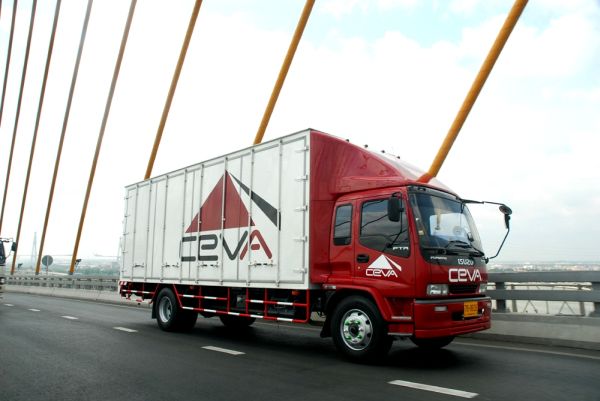 After four months of bidding, CEVA Group PLC — a UK public limited company owned by affiliates of New York City-based Apollo Management LP — has emerged as the winner for Houston-based logistics company EGL, Inc. over the management led-private equity bid championed by EGL chairman and CEO, Jim Crane (prior posts here). Although his private equity buyout failed, Crane is certainly not a loser on the deal. His 17.4% stake in EGL has increased in value by about 60% over the past four months, which means his EGL stock has increased in value by about $125 million to around $337 million. Not exactly a bitter pill to swallow.
After four months of bidding, CEVA Group PLC — a UK public limited company owned by affiliates of New York City-based Apollo Management LP — has emerged as the winner for Houston-based logistics company EGL, Inc. over the management led-private equity bid championed by EGL chairman and CEO, Jim Crane (prior posts here). Although his private equity buyout failed, Crane is certainly not a loser on the deal. His 17.4% stake in EGL has increased in value by about 60% over the past four months, which means his EGL stock has increased in value by about $125 million to around $337 million. Not exactly a bitter pill to swallow.
Although the winning bid in this type of competition is always interesting, a fascinating development was revealed yesterday in a Schedule 13D/A that EGL filed with the Securities and Exchange Commission. Get a load of this:
EXPLANATORY NOTES: This Amendment No. 8 to Schedule 13D (this “Amendment”) is being filed by James R. Crane and the other reporting persons (collectively, the “Reporting Persons”) signatory hereto as identified in the Schedule 13D filed on January 22, 2007, . . .
The Reporting Persons wish to make clear that Mr. E. Joseph Bento, who was one of the signatories to the Schedule 13D filed on January 22, 2007 and to Amendments No. 1 through 7 thereof as previously filed, was not a signatory to Amendment No. 8 to the Schedule 13D and is not a signatory to this Amendment.
The Reporting Persons have excluded Mr. Bento as a signatory and as a member of the group because they believe, based on reliable information, that Mr. Bento, while purporting to cooperate with the Reporting Persons in their offer to acquire the Issuer, in fact has been secretly and improperly cooperating with Apollo Management VI, L.P. and its portfolio company, CEVA Group Plc (collectively, “Apollo/CEVA”) in the competing offer by Apollo/CEVA to acquire the Issuer.
The Reporting Persons further believe, based on reliable information that, while holding himself out to the Reporting Persons as a person cooperating with the Reporting Persons’ bid for the Issuer, Mr. Bento in fact has, without the prior knowledge of or permission from the Reporting Persons, improperly shared confidential information relating to the Reporting Persons’ bidding strategy and other confidential information regarding the Reporting Persons’ offer to acquire the Issuer. The Reporting Persons cannot give any assurance that prior statements of Mr. Bento in the Schedule 13D as to his intentions were in fact truthful and accurate.
The Reporting Persons intend to explore all appropriate remedies, including legal action for damages and other relief, that they may have against Mr. Bento.
Well, you certainly don’t read excerpts like that every day while perusing SEC filings!
It’s a bit difficult to know at this point what the claim against Berto would be. It would not appear that EGL or its shareholders have been damaged by anything the Berto is alleged to have done. Although Crane’s group may have been hurt in its effort to become the winning bid by information that Berto supposedly provided to Apollo/CEVA, it’s not as if Crane and his group were prevented from continuing to bid on the company. That Crane and his group might have been the successful bidder at a lower price but for Berto’s supposed leaking of confidential information doesn’t seem like much of a basis for a lawsuit because that lower bid would have come at the expense of EGL’s shareholders to whom Crane and his management team still owed a fiduciary duty. So, we’ll just have to stay tuned on that potential litigation front.
At any rate, one has to tip their hat to EGL’s Special Committee of the Board of Directors, its counsel (Andrews & Kurth) and its financial advisors (Deutsche Bank) — they really played these two competing bidders off on each other brilliantly. Although at first CEVA/Apollo appeared to be a tire-kicker, they turned out to be a motivated buyer because EGL represented a special opportunity to acquire a substantial freight forwarding business that could be integrated with CEVA’s existing contract logistics business. On the other hand, EGL was Crane’s baby, so the board knew that his group would also fight hard to retain control. In the end, Apollo/CEVA paid an extremely favorable price for a company that has not been doing all that well over the past couple of years and certainly was not considered a hot property in the marketplace. EGL shareholders did not quite get their 52-week high stock price of $51.49, but they did end up receiving almost a 60% premium on their $29.78 share price when this all started.
Suffice it to say that such a premium would have been realized had Ben Stein been calling the shots.
